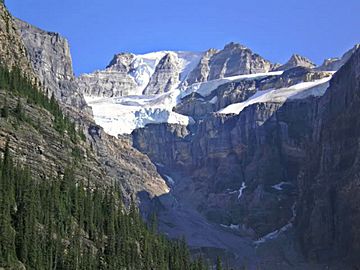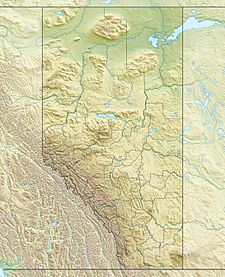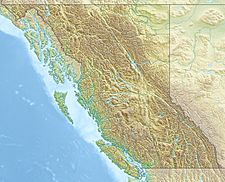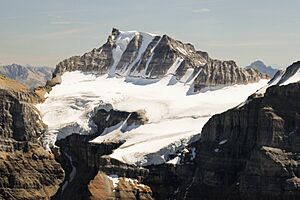Mount Fay facts for kids
Quick facts for kids Mount Fay |
|
|---|---|

Mount Fay seen from Moraine Lake
|
|
| Highest point | |
| Elevation | 3,235 m (10,614 ft) |
| Prominence | 389 m (1,276 ft) |
| Parent peak | Mount Allen 3280 m |
| Geography | |
| Country | Canada |
| Parent range | Bow Range |
| Topo map | NTS 82N/08 |
| Climbing | |
| First ascent | 1904 Gertrude Benham, Christian Kaufmann |
| Easiest route | South-West Face |
Mount Fay is a tall mountain in the Canadian Rockies. It sits right on the border between the provinces of Alberta and British Columbia. This mountain is part of the Continental Divide. This means it helps separate rivers that flow to the Pacific Ocean from those that flow to the Atlantic or Arctic Oceans.
Mount Fay is a beautiful sight behind Moraine Lake. This lake is found in the Valley of the Ten Peaks inside Banff National Park. The mountain got its name in 1902 from Charles Ernest Fay. He was an early explorer who loved the Canadian Rockies.
Contents
Climbing Mount Fay
Mount Fay is a popular spot for climbers. Over the years, many people have tried to reach its peak.
First Climbs
- 1904: The very first time someone climbed Mount Fay was in 1904. A climber named Gertrude Benham made it to the top. She actually reached the summit before Charles E. Fay, who the mountain is named after!
- 1937: The first time anyone climbed Mount Fay in winter was on December 22, 1937. E.R. Gibson, Doug Crosby, and Bob Hind were the brave climbers.
Challenging Routes
- 1984: A very difficult route on the mountain's East Face was first climbed in 1984. This climb was done by Barry Blanchard, David Cheesmond, and Carl Tobin. It is known as a very tough climb.
- 2019: This same East Face route was climbed again in April 2019. This time, Brette Harrington, Luka Lindič, and Ines Papert completed the challenging ascent.
How Mount Fay Formed
Mount Fay, like other mountains in Banff National Park, is made of sedimentary rock. This type of rock forms from layers of sand, mud, and tiny bits of sea creatures that settle at the bottom of ancient seas.
Rock Layers
The rocks in Mount Fay were formed over millions of years. This happened during periods called the Precambrian and Jurassic times. These are very old geological periods.
Mountain Building
Later, a huge event called the Laramide orogeny happened. This was a time when Earth's plates crashed together. This powerful force pushed the layers of sedimentary rock upwards. It even pushed older rock layers over the top of younger ones, creating the tall mountains we see today.
Mount Fay's Climate
Mount Fay has a subarctic climate. This means it has very cold and snowy winters. The summers are usually mild, not too hot.
Winter Weather
In winter, temperatures can drop very low, sometimes below -20 degrees Celsius. When you add the wind chill factor, it can feel even colder, sometimes below -30 degrees Celsius. This makes climbing in winter very challenging!
 | William L. Dawson |
 | W. E. B. Du Bois |
 | Harry Belafonte |




